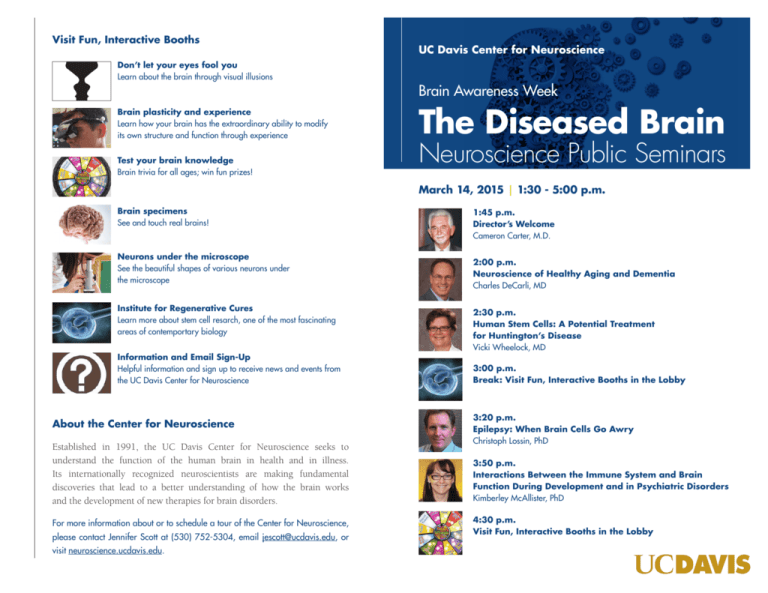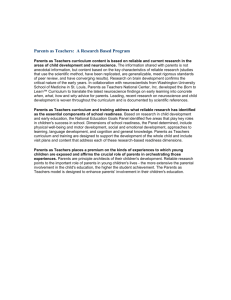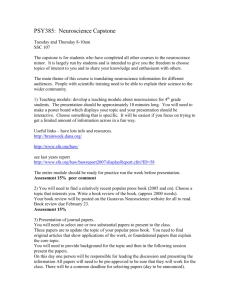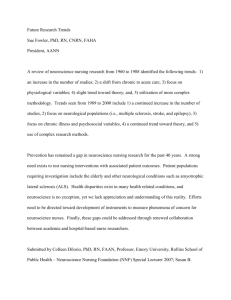The Diseased Brain - UC Davis Center for Neuroscience
advertisement

Visit Fun, Interactive Booths Don’t let your eyes fool you Learn about the brain through visual illusions Brain plasticity and experience Learn how your brain has the extraordinary ability to modify its own structure and function through experience Test your brain knowledge Brain trivia for all ages; win fun prizes! UC Davis Center for Neuroscience Brain Awareness Week The Diseased Brain Neuroscience Public Seminars March 14, 2015 | 1:30 - 5:00 p.m. Brain specimens See and touch real brains! Neurons under the microscope See the beautiful shapes of various neurons under the microscope Institute for Regenerative Cures Learn more about stem cell resarch, one of the most fascinating areas of contemportary biology Information and Email Sign-Up Helpful information and sign up to receive news and events from the UC Davis Center for Neuroscience About the Center for Neuroscience Established in 1991, the UC Davis Center for Neuroscience seeks to understand the function of the human brain in health and in illness. Its internationally recognized neuroscientists are making fundamental discoveries that lead to a better understanding of how the brain works and the development of new therapies for brain disorders. For more information about or to schedule a tour of the Center for Neuroscience, please contact Jennifer Scott at (530) 752-5304, email jescott@ucdavis.edu, or visit neuroscience.ucdavis.edu. 1:45 p.m. Director’s Welcome Cameron Carter, M.D. 2:00 p.m. Neuroscience of Healthy Aging and Dementia Charles DeCarli, MD 2:30 p.m. Human Stem Cells: A Potential Treatment for Huntington’s Disease Vicki Wheelock, MD 3:00 p.m. Break: Visit Fun, Interactive Booths in the Lobby 3:20 p.m. Epilepsy: When Brain Cells Go Awry Christoph Lossin, PhD 3:50 p.m. Interactions Between the Immune System and Brain Function During Development and in Psychiatric Disorders Kimberley McAllister, PhD 4:30 p.m. Visit Fun, Interactive Booths in the Lobby Every March, Brain Awareness Week celebrates the progress and benefits of brain research. The UC Davis Center for Neuroscience is pleased to bring together faculty across discplines to share their innovative research on brain function in health and disease: Charles DeCarli, M.D. is Professor of Neurology at UC Davis and recipient of the Victor and Genevieve Orsi Chair in Alzheimer’s Research. He is the Director of the UC Davis Alzheimer’s Disease Center, a United States National Institutes of Health funded Alzheimer’s research center. He is also Director of the Imaging of Dementia and Aging (IDeA) laboratory. His research focuses on using advanced structural and functional brain imaging to study normal aging, mild cognitive impairment and dementia and the role of genetics, cerebrovascular and Alzheimer’s disease on these processes. He is a recipient of the J. Allyn Taylor International Prize in Medicine—Imaging of the Aging Brain in recognition of his work. Dr. DeCarli also is the Editor-in-Chief of Alzheimer Disease and Associated Disorders, an international journal of Alzheimer’s disease research. Vicki Wheelock, M.D. is a Health Sciences Clinical Professor and the director of the Huntington’s Disease Society of America Center of Excellence at UC Davis. She is the principal investigator of a grant funded by the California Institute of Regenerative Medicine (CIRM) to develop a novel treatment utilizing adult stem cells to treat Huntington’s disease, an inherited neuropsychiatric disease for which no current disease-modifying treatments exist. Dr. Wheelock will discuss progress of the pre-clinical portion of the grant under the direction of co-principal investigator Dr. Jan Nolta, director of the UC Davis Institute for Regenerative Cures, as well as progress in a lead-in observation study called PRE-CELL. The CIRM award to fund this research gives hope to patients and families affected by HD to make progress in battling this devastating disease. Christoph Lossin, Ph.D. was born and raised near Stuttgart, Germany, and emigrated to the US in 1996 to study physiology. He earned a Masters degree at the University of Delaware and a Doctorate from the Vanderbilt University in Nashville, exploring the molecular basis of inheritable epilepsy. In 2004, he moved his research to Osaka University in Japan to explore how various drugs can influence brain cell function. Since 2008, he has been a member of the UC Davis Neurology Department, where he is devoted to experiments on ion channels, which are important regulators of brain cell communication. Malfunction of these ion channels can make brain cells overly active; in essence, the brain cells lose control and produce a “storm” of electrical signals, resulting in a cacophony that overwhelms meaningful communication between them. In mild cases, this ion channel-related brain cell storm causes only temporary problems, showing up as benign seizures shortly after birth that quickly disappear. In some cases, however, ion channel malfunction can throw the brain into utter chaos, leading to epilepsy that can severely disrupt brain function and learning, occasionally resulting in early death. Dr. Lossin’s research goal is to find new and improved therapies for these devastating seizure disorders. Kimberley McAllister, Ph.D., is the Asociate Director of the Center for Neuroscience and a Professor of Neurology and Neurobiology, Physiology and Behavior. She received her Ph.D. in neuroscience from Duke University in 1996 followed by postdoctoral training at the Salk Institute. Since joining the UC Davis Center for Neuroscience in 2000, Dr. McAllister’s research focuses on elucidating the cellular and molecular mechanisms of synapse formation and plasticity in the developing brain, as well as the roles for immune molecules in brain development and disease. She has received several honors for her work, including the Society for Neuroscience Young Investigator award, a Basil O’Connor Starter Scholar Award, an Alfred P. Sloan Research Fellowship, a Pew Foundation Scholar Award, and a Merck Scholars Award. At UC Davis, she has received a Chancellor’s award, a Neuroscience Program Service award, and a Research Investments in Sciences and Engineering (RISE) award.




